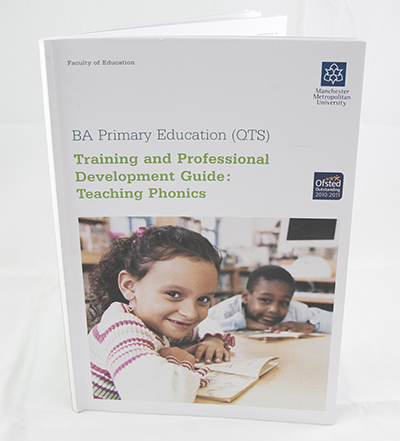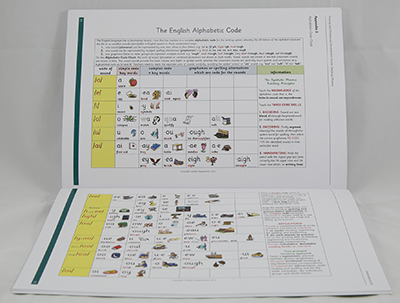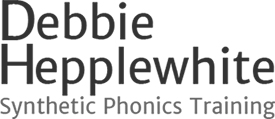The English alphabetic code and Alphabetic Code Chart
 It is important for student-teachers to get a thorough grasp of the letter/s-sound correspondences of the English alphabetic code and to this end they are well supported by referring to a comprehensive and generic student-teachers’ Alphabetic Code Chart. (The images to the left and below show Manchester Metropolitan University's 'Training and Professional Development Guide: Teaching Phonics' which features one of Debbie's Alphabetic Code Charts designed to support teacher training.) Although the alphabetic code is ‘reversible’, there are details about the code that are helpful for teaching reading specifically and for teaching spelling specifically which are featured in the design of Debbie’s Alphabetic Code Charts, training and programmes. It is important for student-teachers to get a thorough grasp of the letter/s-sound correspondences of the English alphabetic code and to this end they are well supported by referring to a comprehensive and generic student-teachers’ Alphabetic Code Chart. (The images to the left and below show Manchester Metropolitan University's 'Training and Professional Development Guide: Teaching Phonics' which features one of Debbie's Alphabetic Code Charts designed to support teacher training.) Although the alphabetic code is ‘reversible’, there are details about the code that are helpful for teaching reading specifically and for teaching spelling specifically which are featured in the design of Debbie’s Alphabetic Code Charts, training and programmes.
The Systematic Synthetic Phonics Teaching Principles
Student-teachers need to understand the Systematic Synthetic Phonics Teaching Principles in a generic way and appreciate that handwriting is a neglected skill in the official ‘core criteria’ for evaluating phonics provision. If student-teachers are clear about the SSP teaching principles including good knowledge of the alphabetic code and the three core phonics skills (decoding, encoding and handwriting) and their sub-skills, alongside the need for application and extension activities with cumulative, decodable material, then they will be well-equipped to examine the provision and balance of activities they observe in their practice schools and schools in which they eventually secure teaching roles. They should also be able to evaluate programmes and practices independently and objectively with the potential to make a significant contribution to the field of basic literacy moving forwards. Debbie promotes ‘two-pronged systematic and incidental synthetic phonics teaching’ – find out more about this special approach.
The History of the English language leading to a complex code
 Along with their SSP subject knowledge, student-teachers will benefit from considering a starting point which embraces the history of the English language and the subsequent complex nature of the English alphabetic code to share with pupils from age four upwards. Any difficulties that children (and adults) experience can then be attributed to the history of the language and the complex code rather than endangering the child’s self-esteem. Along with their SSP subject knowledge, student-teachers will benefit from considering a starting point which embraces the history of the English language and the subsequent complex nature of the English alphabetic code to share with pupils from age four upwards. Any difficulties that children (and adults) experience can then be attributed to the history of the language and the complex code rather than endangering the child’s self-esteem.
The Simple View of Reading and pupils’ reading profiles
Since the Final Rose Report (March 2006), the multi-cueing reading strategies (‘searchlights’) have been replaced by the Simple View of Reading model and so students should not only be clear about the relationship between the processes of ‘word decoding/recognition’ and ‘language comprehension’ helping them to identify pupils’ reading profiles, but also they should be able to evaluate differently ‘miscue analysis’ (‘running records’) and to note the changes in reading profiles as a consequence of different teaching methods and reading-book practices.
Fit-for-purpose multi-sensory versus ‘extraneous’ activities
Rose described in his report how ‘multi-sensory’ activities could be age-appropriate for five year olds but he also warned about ‘extraneous’ practice. What did he mean and what is the reality in many schools? With pressures and tensions in the early years, practitioners may be given contradictory advice regarding the nature of ‘multi-sensory’ activities and phonics practices. What are the issues in the early years?
The Teaching and Learning Cycle
The phonics Teaching and Learning Cycle is potentially a really effective teaching and learning concept so what does this look like as daily provision in mainstream classes and for intervention requirements? Many teachers struggle with providing effective practices to address every child’s learning needs and the question is often raised regarding the advisability of ‘groups or whole class’ organisation. What is generally recommended by SSP programme authors and how does their guidance vary? What do different practices look like and on what can decisions be based in different contexts? What are the realities regarding ‘time scales’ and ‘pace’ for phonics and basic skills provision?
Building capacity to evaluate phonics programmes and practices
Students need to be capable of evaluating phonics programmes and practices in use in schools with a knowledgeable, discerning and critical eye. Whilst there is some excellent practice in infant and primary schools, there is also weak and muddled practice – teachers working very hard but not necessarily ‘effectively’. Teachers often work in schools with many challenging circumstances and under immense pressure from the observation and inspection regime. What does this mean for primary teaching nowadays and how can the pressures help or skew what teachers would provide if they were given greater autonomy? If the teaching profession had been better equipped to evaluate ‘Letters and Sounds’ with a critical eye, would it have been put forward as a ‘programme of choice’ or understood simply as a detailed ‘framework’ since it has no teaching and learning resources. Who, then, has had to turn ‘Letters and Sounds’ into a ‘programme’, what does this entail and what might a ‘Letters and Sounds’ school typically look like?
Whole school consistency and continuity - programme, planning, preparation, management and effective practices
Planning, resource preparation and management of the delivery of phonics are all issues with which some schools struggle. Do student-teachers know the difference between phonics hand routines for reading and phonics hand routines for spelling when so many teachers are confused and muddled themselves? Do they know how to develop the phonics teaching as longer-term spelling word bank learning, vocabulary enrichment, grammar and comprehension activities especially as phonics programmes may be designed only for infants? Over time, it becomes more challenging to provide for widening gaps in children’s alphabetic code knowledge and skills and many schools acknowledge they struggle with ‘whole school consistency and continuity’. What are the dangers of less effective teaching and learning practices being explained away by the notion of children’s ‘individual learning difficulties’?
|


 It is important for student-teachers to get a thorough grasp of the letter/s-sound correspondences of the English alphabetic code and to this end they are well supported by referring to a comprehensive and generic student-teachers’ Alphabetic Code Chart. (The images to the left and below show Manchester Metropolitan University's 'Training and Professional Development Guide: Teaching Phonics' which features one of Debbie's Alphabetic Code Charts designed to support teacher training.) Although the alphabetic code is ‘reversible’, there are details about the code that are helpful for teaching reading specifically and for teaching spelling specifically which are featured in the design of Debbie’s Alphabetic Code Charts, training and programmes.
It is important for student-teachers to get a thorough grasp of the letter/s-sound correspondences of the English alphabetic code and to this end they are well supported by referring to a comprehensive and generic student-teachers’ Alphabetic Code Chart. (The images to the left and below show Manchester Metropolitan University's 'Training and Professional Development Guide: Teaching Phonics' which features one of Debbie's Alphabetic Code Charts designed to support teacher training.) Although the alphabetic code is ‘reversible’, there are details about the code that are helpful for teaching reading specifically and for teaching spelling specifically which are featured in the design of Debbie’s Alphabetic Code Charts, training and programmes. Along with their SSP subject knowledge, student-teachers will benefit from considering a starting point which embraces the history of the English language and the subsequent complex nature of the English alphabetic code to share with pupils from age four upwards. Any difficulties that children (and adults) experience can then be attributed to the history of the language and the complex code rather than endangering the child’s self-esteem.
Along with their SSP subject knowledge, student-teachers will benefit from considering a starting point which embraces the history of the English language and the subsequent complex nature of the English alphabetic code to share with pupils from age four upwards. Any difficulties that children (and adults) experience can then be attributed to the history of the language and the complex code rather than endangering the child’s self-esteem.